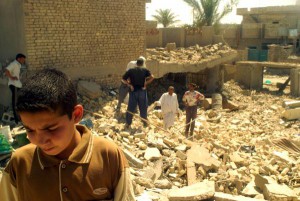Iraqi security forces on Fallujah’s southern outskirts halted offensive operations against the Islamic State on Thursday amid fears for the safety of 50,000 civilians being used as human shields.
Their ongoing dilemma is how to protect and evacuate men, women and children who are being held by the extremist group.
Iraqi units have been told not to attempt to breach Islamic State lines, said army and police officials.
On Wednesday, counter-terrorism units paved the way for a move into Fallujah by breaking through a sand berm built by Islamic State forces in Nuaimiya, on the city’s southern outskirts, said Fallujah’s exiled mayor, Eissa al-Issawi.
“The gap is big enough to allow military vehicles to go through it,” Mr. Issawi said, adding that the units were “awaiting orders to break into Fallujah city.”
Counter-terrorism forces spokesman Sabah al-Nouman said: “This direction is the fastest and most effective one when attempting to break into the city center, despite the fact that it has tunnels full of explosives.
He insisted that forces were still advancing, but slowly and “with caution” to avoid the explosives.
Islamic State fighters have been booby-trapping bridges, roads, even drainage pipes, say Iraqi officials.
“We are still cleansing all liberated areas from explosives,” said Gen. Saad Harbiya, commander of army operations in western Baghdad, who is leading some forces on Fallujah’s southern front.
A separate offensive is under way northwest of Fallujah to complete the encirclement of the city, led by Shiite Muslim militias backed by Iraqi army and police forces.
U.S.-backed Iraqi Prime Minister Haider al-Abadi said Wednesday that victory was “within reach.”
But Abadi is being criticized in some quarters for attempting to take back Fallujah with seemingly under-trained, under-equipped and divided security forces. His opponents accuse him of rushing the offensive in the hope of boosting his own flagging popularity.
“The timing of the Fallujah initiative is very much politically motivated,” said Lina Khatib, the head of the Middle East program at the London-based Chatham House research institution. “Abadi has not yet delivered politically so in a way he is seeking stability through military engagement against” ISIS.
The United Nations believes at least 50,000 civilians are trapped inside the city, but aid workers say that the number could be double that.
“Commanders on the ground have discussed the issue of waiting until civilians get out and how this may negatively affect the operation,” said Brig. Ahmed al-Bilawi, head of the emergency police unit in Anbar province, where Fallujah is located.
“They favor waiting for more civilians to come out, so we have had to listen to them the past few days.”
The Iraqis’ offensive to retake Fallujah, supported by U.S.-led coalition airstrikes, began May 23. The offensive is joined by Iraqi counter-terrorism forces, Iraqi police, tribal fighters and the Popular Mobilization Forces Shiite militia group. Fallujah, about 40 miles west of Baghdad, has been under Islamic State control since early 2014.
“The general principle on which this whole operation is based is how to protect civilians,” acknowledged Saad Hadithi, a spokesman for Prime Minister Haider al-Abadi.
Lise Grande, a U.N. official in Iraq, said Tuesday that the Islamic State was rounding up civilians in four locations inside Fallujah and were preventing people there from leaving—an indication, she said, they were being used as human shields.
The Iraqi army and allied Shiite militias have laid siege to the city for months, cutting it off from the outside world and creating shortages of food and medical supplies. Phone networks are down, and electricity is scarce.
Human rights groups from Anbar province say bombings by Iraqi air force planes since 2014 have killed dozens of civilians.
The Islamic State has reportedly killed civilians as they attempted to flee the city, which was once populated by about 300,000 people. The United Nations warns that residents face starvation due to food shortages and high prices. Deaths from starvation have already been reported.
Norwegian Refugee Council Secretary-General Jan Egeland previously warned of “a human catastrophe” in Fallujah.
“Families are caught in the crossfire with no safe way out,” Egeland said in a statement. “Warring parties must guarantee civilians’ safe exit now, before it’s too late and more lives are lost.”
upi.com



